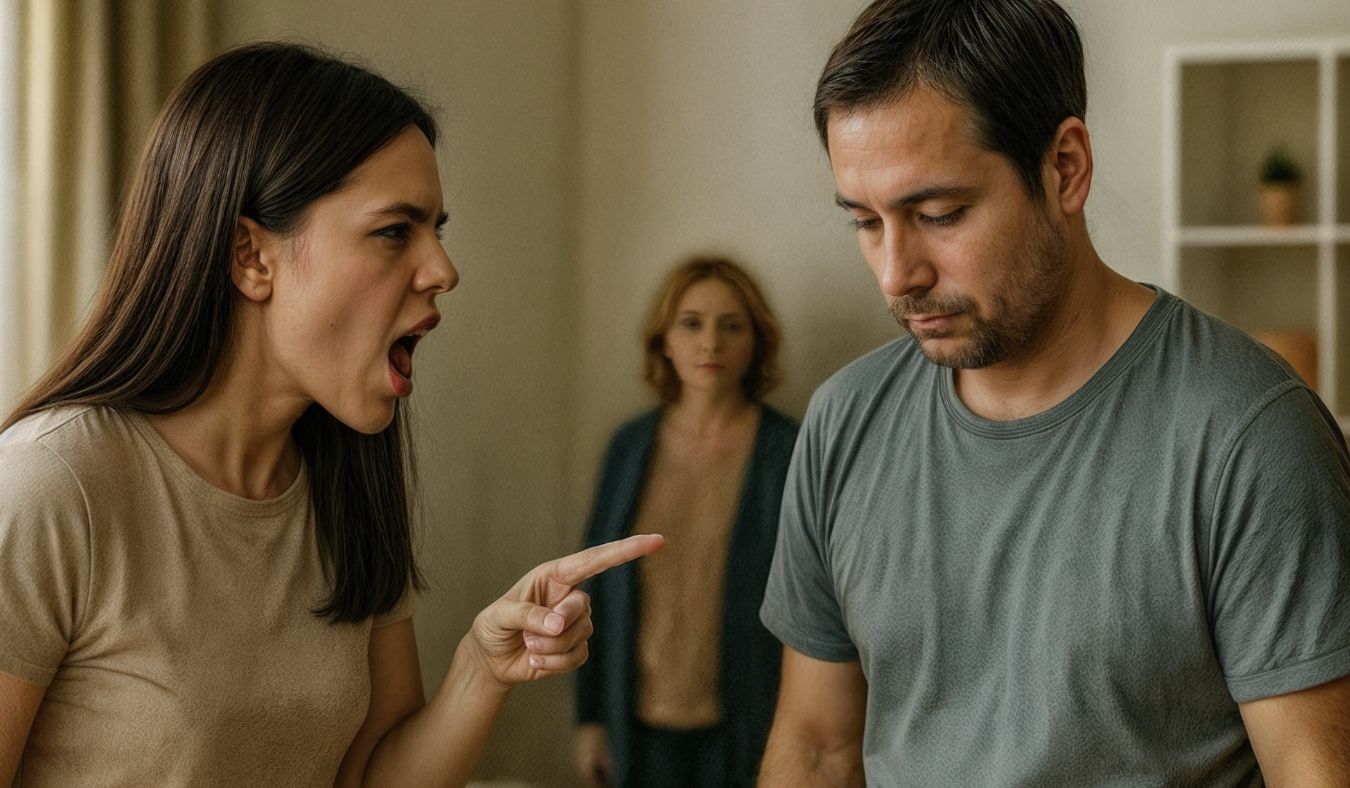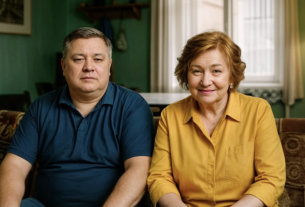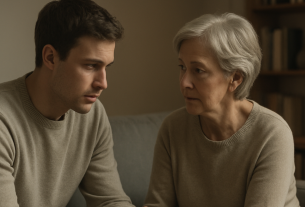I am not cleaning up this mess after your guests!” Karina snapped. “I didn’t invite them, didn’t feed them, and didn’t pour their drinks.”
Alexei flinched at the sharpness in his wife’s voice and guiltily looked at the havoc in the gazebo. Empty bottles were lying under the benches, puddles of spilled beer had dried on the table, and in the corner someone had left cigarette butts right on the wooden floor.
“Sveta, don’t be mad. I told you—I’ll clean everything up in the morning.”
“Karina. My name is Karina,” his wife corrected him, folding her arms over her chest. “And this is not about the cleaning.”
It had all started three days earlier, when Alexei timidly asked for permission to invite some friends to the dacha. Karina had bought this plot last year after selling her old apartment. A small house in a pine forest, an hour’s drive from the city—an ideal place to work in peace and quiet. She had registered everything in her name and put her own money into renovating the veranda and the gazebo.
They both worked remotely. Karina did marketing for a large IT company and earned a stable eighty-five thousand a month. Alexei scraped by on freelance gigs—some web design, some advertising for small businesses. His income bounced between thirty and eighty thousand, but never dropped below sixty.
The summer turned out hot. Karina happily moved to the dacha at the beginning of June—here she could work in the fresh air and not suffer from the stuffiness of the city apartment. Alexei followed his wife, bringing along his tablet and camera. The first weeks passed quietly: coffee on the veranda in the morning, work in the shade of the apple trees during the day, garden beds and buckets from the well in the evening.
“I want to invite the guys over one evening,” Alexei said over breakfast on Wednesday. “Barbecue, beer, just hang out. No overnight stays, everything will be civilized.”
Karina looked up from her laptop. Her husband sat opposite, twisting a teaspoon in his fingers and trying not to meet her eyes.
“Who exactly?”
“Well, Sergei, Maxim, maybe Volodya. Three of them, no more. They’ll come in the evening, and we’ll be done by eleven.”
“By eleven?”
“Well, midnight at the latest. Then they’ll head home.”
Karina turned back to the screen. Her report on an ad campaign was due, and the client had demanded it by Friday.
“All right. But on certain conditions.”
“What conditions?”
“First—one evening only. No sleepovers and no ‘let’s continue tomorrow.’ Second—I’m not taking part in cooking or waiting on anyone. Third—you do all the cleaning yourself.”
“Of course!” Alexei brightened noticeably. “I told you, everything will be civilized.”
The friends arrived on Friday closer to seven in the evening. Karina watched from the kitchen window as Sergei’s battered Priora drove into the yard. From the trunk they pulled out a case of beer, a big speaker, bags of food, and red plastic cups.
Sergei worked as a car mechanic, wore tracksuits, and spoke loudly. Maxim sold car parts—always in jeans and T-shirts with English words on them. Volodya was listed as a manager at some company, but what he actually did, Karina didn’t know. All three were single, lived with their parents, and treated life like an endless series of weekends.
“Guys, this is gorgeous!” Sergei yelled, taking in the yard. “Like paradise!”
“Let’s get the meat on the grill!” Maxim chimed in, waving a bag of marinated shashlik.
Alexei bustled around, helping his friends unload. They turned on the music—the bass thumped so hard the windows in the house rattled. Karina winced but said nothing. She took her laptop and went into the bedroom.
Working to a soundtrack of songs by Lyube turned out to be impossible. Karina put on headphones, but the voices still punched through the walls. Volodya was especially loud—apparently he’d had more to drink than the others.
“Remember how we were in the army…” one of them would start.
“Remember how Lenka last year…” another would pick up.
“Remember how Tolik and I…” the third would chime in.
Karina closed her laptop and lay down on the bed. Outside, she could smell smoke from the grill, and hear laughter and the clink of bottles. The clock showed half past eight.
By ten in the evening the music got even louder. Karina looked out the window—Alexei and his friends were sitting in the gazebo, each with several empty bottles in front of him. Sergei was gesturing wildly, arguing about something. Maxim was singing along to the music, swaying on his chair. Volodya was sprawled on a bench, his head thrown back.
At eleven o’clock no one was even thinking of leaving. On the contrary—Sergei was calling someone and yelling into his phone:
“Come over! It’s totally awesome here! The place is great!”
Karina frowned. It looked like the company was about to expand.
“Lyoha, your place is fire!” Maxim shouted. “We gotta come here more often!”
“Sure thing!” Alexei called back. “Karina doesn’t mind.”
His wife clenched her fists. Since when had she agreed to turn the dacha into a party spot?
At half past eleven Karina’s patience ran out. She threw on her robe and stepped onto the veranda. Alexei was sitting next to Sergei, his face red and his eyes glittering.
“Lesha,” she called to her husband. “It’s already late.”
“Ah, Karinochka!” Alexei waved a hand. “Meet the guys—this is Sergei, Maxim, and Volodya.”
“We’ve met,” Karina replied dryly. “Alexei, do you remember what we agreed on?”
“Agreed on what?” Her husband was clearly not thinking straight.
“About the time. Until eleven, midnight at the latest.”
“Oh, come on, Karina!” Sergei cut in. “It’s Friday! You only live once!”
“Hey guys, how about we play some cards?” Maxim suggested. “Or backgammon?”
Volodya lifted his head from the bench.
“Where can I take a leak around here?”
“In the house,” Alexei waved. “First door on the right.”
Karina gritted her teeth. They had agreed—no going into the house.
“Alexei, I have to get up early tomorrow,” she said firmly. “I’m asking you to wrap this up.”
“Just half an hour more,” her husband mumbled. “The guys drove a long way.”
“Half an hour—and that’s it.”
Karina turned and went back into the house. Laughter followed her.
“Your wife’s strict!” someone guffawed.
“She’s fine,” Alexei was defending her. “She just has a serious job.”
At one in the morning the music finally stopped. Karina looked out of the window—the gazebo was empty, but the light was on in the kitchen. She heard voices and running water.
In the morning Karina woke up at half past six—by force of habit. It was already light outside, birds were singing in the garden. Alexei was asleep beside her, snoring and reeking of alcohol.
His wife got up, pulled on her robe, and went into the kitchen. The sight made her stop dead in her tracks.
A mountain of dirty dishes towered in the sink—plates with dried bits of meat, glasses with yellow foam at the bottom, a frying pan congealed in grease. On the table were puddles of spilled beer, bread crumbs, and apple cores. The refrigerator door stood wide open, cans and bottles sticking out of it.
In the entryway Karina found even more traces of last night’s fun. The rug was stained with dark spots, and empty bottles were scattered in the corner. A mug lay on the floor in shards—apparently someone had dropped it and couldn’t be bothered to clean it up.
But the most interesting part was waiting in the gazebo. Maxim was sleeping on the bench, covered with someone’s jacket. On a mattress in the corner Sergei was dozing, hugging an empty bottle. And on the kitchen sofa, still wearing his sneakers, lay Volodya—the beer can was still clutched in his right hand.
Karina slowly walked around the entire property, taking stock of the damage. Last night’s “civilized evening without sleepovers” had turned into a booze-up with full-scale billeting all over the place.
She went back into the house and started packing. She put her laptop, chargers, and documents into a bag. Changed into jeans and a T-shirt and grabbed her wallet.
Alexei was still asleep, sprawled across the whole bed. Karina looked at her husband for a few seconds, then quietly left the bedroom.
Out in the yard the guests were starting to stir. Maxim was sitting on the bench, holding his head and groaning. Sergei was fussing at the outdoor sink, trying to freshen up. Volodya was still asleep on the sofa.
Karina ordered a taxi and waited by the gate. When the car pulled up, she tossed her bag onto the back seat and got in next to the driver.
“To the city,” she said curtly, giving the address.
On the way she sent Alexei a single text message: “You’re a grown man. You clean up yourself. I’m at the apartment. I don’t need this kind of ‘rest.’”
Alexei started calling an hour later. Karina didn’t pick up. Then came the messages—first apologetic, then pleading. Her husband wrote that he’d cleaned everything, the friends had left, it would never happen again. That he’d understood everything himself, that he’d gone overboard.
Karina read and deleted. She didn’t need explanations, she needed silence. A reset. Time to figure out whether she was willing to put up with this kind of thing any longer or not.
The next day Alexei came into the city. He rang the intercom, but Karina didn’t buzz him in. He stood beneath the windows, tried calling. By evening his wife relented and let him into the apartment.
Alexei looked rumpled, his hair disheveled, his eyes red. He walked into the room, sat down on the couch, and folded his hands on his knees.
“I’m sorry,” he said quietly. “I realize now what I’ve done.”
Karina stood in the doorway, arms crossed over her chest.
“And what exactly do you realize?”
“That I went too far. I thought you wouldn’t be upset about the guys.”
“Alexei, if you can’t tell the difference between ‘a fun evening’ and a makeshift boarding house, then you and I are living on different settings.”
Her husband tried to smile.
“Well, it happens. The guys relaxed, I didn’t keep an eye on things…”
“It doesn’t happen with me,” Karina cut him off. “With me, that does not happen. And it won’t. Not on my property.”
Alexei fell silent. From his wife’s expression he understood that this was serious. Not a funny story he could later tell his friends, but a real conflict with consequences.
“What do you want?” he asked cautiously.
“I want you to remember: my dacha is not a hangout spot for your friends. If you need guys’ weekends, have them somewhere outside our home. At Sergei’s, at Maxim’s, in a bar—anywhere. Just not on my property.”
“And we can’t do it together?”
“We can. But with respect. For my time, my space, and my things. Remember how Volodya almost broke the kitchen sofa? How Maxim walked through the house in dirty boots? How they smoked in the gazebo I painted myself?”
Alexei lowered his eyes. Karina could see that it was sinking in. Her husband was replaying last night in his head and realizing exactly where it had all gone wrong.
“I thought those were little things…”
“Little things to you. To me—it’s my life. My money, my work, my time.”
“All right. I won’t invite them over anymore.”
“Alexei, it’s not just about your friends. It’s that you present me with a done deal. You say ‘just one evening’—and it turns into an overnight stay. You promise ‘civilized’—and it turns into a binge. We agree on ‘no going into the house’—and they’re lying on my couch.”
Her husband shifted uncomfortably.
“I didn’t mean to…”
“Not meaning to is the worst part. It means you don’t think about the consequences at all.”
Alexei stayed quiet. Karina walked over to the window and looked out at the familiar city rooftops. After the quiet of the dacha, it seemed noisy and stuffy here.
“If you want us to stay together, learn to agree things in advance,” she said. “Not decide for me what I’ll put up with.”
“Okay,” her husband nodded quickly. “I get it.”
A week later Alexei suggested they go out to the dacha together. He said he had cleaned up all the trash, replaced the dishes, even bought a new bedspread to replace the ruined one. Karina agreed, but set a condition:
“Just the two of us. No surprise visits, no calls to your friends, no ‘hey, let’s invite someone else.’”
“I promise,” Alexei replied seriously.
It really was quiet at the dacha. Her husband had kept his word—he had cleaned everything down to the last detail, even washed the gazebo and repainted the scratched boards. Over dinner they talked calmly, without tension.
“I really didn’t mean to upset you,” Alexei said as he poured her tea. “I just didn’t think about how it looks from your side.”
“And now you understand?”
“I do. You put in money, effort, time—and then someone shows up and ruins everything in one night. As if your work doesn’t matter.”
Karina nodded. That was exactly how it felt.
“It’s important to agree in advance,” she went on. “Not present me with a fait accompli. I’m not against your friends. But on my terms, in my house.”
“And what are those terms?”
“Simple ones. We agree beforehand on the time, the number of people, and what we’re going to do. No going into the house without permission. No trash left behind. No sleepovers without prior warning.”
“That’s fair,” Alexei agreed.
After that, her husband no longer invited his friends to their place. They met in cafés, went fishing, or gathered in Sergei’s garage. No one bothered Karina or crossed her boundaries.
Sometimes she heard Alexei explaining to his friends:
“No, we can’t go to my place. Karina has her own rules, and I respect them.”
Or:
“Let’s do it at your place, Maxim. My wife’s working, we can’t make noise.”
Karina appreciated that her husband didn’t complain about her or call her petty or boring. He simply accepted the new rules and followed them.
For herself she drew an important conclusion: you can explain, but you don’t need to beg. Once—clearly, with action. After that, either the person changes, or you have to choose: keep putting up with it or walk away. Fortunately, Alexei chose the first option.
The summer evenings at the dacha became quiet again. Karina worked on the veranda, her husband read in the gazebo or tinkered in the garden. Sometimes they cooked together, sometimes they just sat in silence, listening to the birds.
A month later Sergei suggested to Alexei:
“So what, maybe we come out to your place again? Nice and civilized, like last time.”
“No,” her husband replied calmly. “We’ve got other plans.”
Hearing this, Karina smiled. Alexei really had learned the lesson. Now she knew: if someone again suggested “just a barbecue for one evening,” she wouldn’t forget how it had ended last time—and she wouldn’t let it happen again.
Boundaries in a relationship aren’t about gender or age. They’re about respect. And if someone is willing to honor those boundaries, you can build something good together. If not—it’s better to put the dots over the “i” right away.
Karina no longer feared seeming harsh or inflexible. Her home, her rules, her life. And that’s perfectly okay



